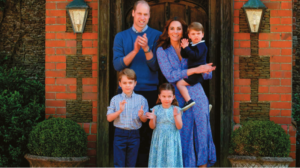The latest and most advanced information about Kate Middleton’s type of cancer pinpoints the disease to her colon. Because of the proverbial secrecy that has always surrounded the British royal family, let alone when it comes to health issues, the reference to colon cancer is neither confirmed nor officially denied.
It remains a leak – and, indeed, coming not from the usual sources, i.e. the British press, tabloids, etc., but from Mark Ross, a Belgian journalist specialised in ‘Buckingham Reportage’, who, speaking to the French ‘Gala’, deliberately or not, revealed a much more complicated situation regarding the Princess’s health, even than cancer.
For Ross spoke of two different aspects of the problems Kate Middleton is facing. One is the hysterectomy. The second, colon cancer.

Kate with William and their three children
As for how these two are connected and combined, complete darkness reigns, as at the moment no one outside of the Windsor inner circle and a few, absolutely secretive, “courtiers” know the truth.
Of course, however, Kate Middleton’s situation is serious. Deadly dangerous, in fact, since a scenario of metastatic malignancy, possibly from the ovaries to the colon, is implied.
Alternatively, there is the possibility that the cancer is related to Crohn’s Disease (inflammatory bowel autoimmunity), from which Kate Middleton suffers.
However, beyond plausible speculation, which in turn is based on anecdotal information, the Princess of Wales in her short video monologue on Friday 22 March said that chemotherapy has already begun – at home, not in a hospital – and that, at the current stage at least, her condition is stable and she “feels OK”.
However, apart from the purely medical issues, Kate’s simple confession, on the one hand, has at once shattered every rumor and every conspiracy fantasy of the dozens that have been circulating at a rate of escalating frenzy throughout the media and social media of the world for about two and a half months.
On the other hand, however, the direct revelation about cancer, together with the spontaneous and expected emotion and compassion it evoked around the world, became the trigger for the creation of a spectacular wave of intense interest in the diagnosis of cancer, a health issue which, more or less, is generally treated as taboo.

As for the version of hysterectomy, if and when it was performed, whether or not it was related to cancer, in the colon or in another organ, etc., it is in itself a special chapter.
A hysterectomy is essentially the removal of the uterus, which may be dictated by an attempt to stop an existing cancer in a woman’s reproductive system, usually at the age of 40 or over.
In retrospect, one might conclude that this is precisely the kind of operation the Princess of Wales underwent in the middle of last January, regardless of the fact that the official – albeit carefully vague – statement from the Palace referred, in general and vague terms, to ‘abdominal surgery’.
So far it remains unclear whether the hysterectomy was partial or total, i.e. whether only the uterus or the entire utero-cervical array was removed from Kate’s body, possibly together with additional organs (fallopian tubes, ovaries, lymph nodes, vaginal tissue, etc.).
Poll: Trudeau likely to be thrown out in election
Of course, even hysterectomy cannot be compared in terms of the severity and the critical consequences for the patient’s survival of a diagnosed cancer – and the side-effects of trying to treat it.
Kate Middleton is undergoing chemotherapy, which, even in its mildest form (and as such is implicitly presented as the one followed in the case of the Princess), places a considerable and multiple burden on the body.
The gradients of the side effects of chemotherapy treatment vary and depend on a number of factors, such as the type and dosage of the drugs, the degree of spread of the disease and, more generally, the reaction of the organism in question, which is never a foregone conclusion, since it even depends on genetic characteristics.
Ask me anything
Explore related questions





